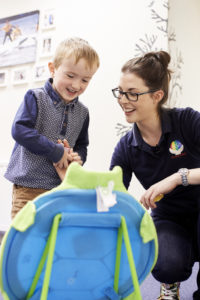Helping Your Child Develop Play Skills
 Playing is one of the most important things you can do with your child to help them develop. Play involves a lot of interaction and helps your child gain confidence, feel safe and loved, develop physical skills. It also enhances speech, language and communication skills.
Playing is one of the most important things you can do with your child to help them develop. Play involves a lot of interaction and helps your child gain confidence, feel safe and loved, develop physical skills. It also enhances speech, language and communication skills.
Children need time to develop play skills and playing with parents also gives children one on one attention and time they crave. As a Speech and Language Therapist, I can’t over-emphasise the importance of finding the time to play with your children on a regular basis. This can be very difficult in a busy household, with many demands, but setting aside even ten minutes would be beneficial. This can be done on a one to one basis or with others.
Children also need to learn how to self-occupy and play by themselves, and you, as parents, can facilitate this. Keeping things interesting, giving structure and establishing routine can support your child’s ability to self-occupy.
Let’s consider the different types of play:
Unstructured, free play is set in a safe environment where there is access to age appropriate toys. The child decides what they are interested in. Then, using their imagination, they play or explore a new space, in their own way, at their own pace. This helps them reach their developmental milestones.
Structured play is organised and happens at a fixed time or in a set space and is often adult lead. Structured play includes activities such as board games, puzzles and group activity.
How can I support play?
When teaching play, I advise that, while surrounding your children with many toys seems like a good idea, filled with parental goodwill and the best of intentions, there can be too much to take in. This can distract and overwhelm a child. Instead, reduce the number of toys available and alternate them.
For babies, when you use varied tone, are smiling and are animated you are effectively playing. This helps your baby engage and develop early focus and attention. You could try music, noise making toys and introduce objects which vary in shape and colour. By using activities your child is interested in, you will hold their attention for longer, maximising learning opportunities.
It can be helpful to praise from a distance and comment on how well they are doing “you did 3 pieces of your puzzle, try one more” Initially your child may only pay attention for a few minutes. Try not to respond by immediately joining in physically. Leave it a few seconds but then get involved. The more often you do this the more you are supporting your child to develop independent play skills and attention.
As your child gets older, they should be able to play by themselves for longer. However, by regularly joining in with your child, you can support the ability to share and develop greater play skills. Family game nights are also to be recommended to enhance interaction and social skills. It also sets the scene for discussion and sharing stories and worries.
If you have any concerns, no matter how small, regarding your child’s ability to play, consult with your GP or Speech and Language Therapist. You may have nothing to worry about. Similarly, if there are difficulties, the earlier these are targeted the better the long term outcome.
In the meantime, play, and have fun!
Written By
Elaine Baldwin Senior Speech & Language Therapist at Sensational Kids
Copyright Sensational Kids CLG 2018

